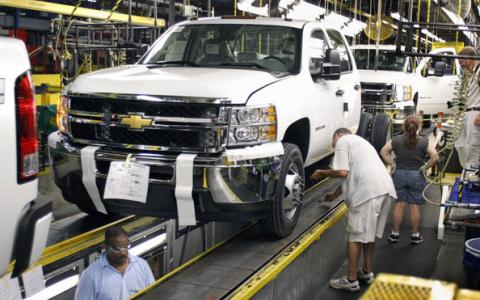
Rising commodity prices, especially for steel and aluminum, and currency fluctuations in South America hurt General Motors Co. second-quarter earnings, which were down 3% from the same period a year ago. With expectations that “headwinds” will continue, the No. 1 U.S. automaker lowered earnings guidance to investors for its full-year 2018 results.
Under GM’s new forecast for all of 2018, earnings-per-share on a diluted basis will be about $5.14, diluted earnings per share on an adjusted basis will be about $6, down from a range of $6.30 to $6.60. Operating cash flow from automotive operations will be about $11.5 billion. Automotive free cash flow on an adjusted basis will be about $4 billion for the year, down from an earlier estimate in the mid-$5 billion range.
GM Financial, the company’s financing arm, earned more than $500 million in the quarter, a salutary development for the automaker, which lost its longtime GMAC finance subsidiary as a result of credit difficulties leading to its 2009 bankruptcy. (GMAC changed its name to Ally and now is a public company.)
GM shares fell more than 6.5% at the open of trading on the New York Stock Exchange.
The headwinds could grow even stronger for GM if tariffs from the Trump administration raise the automaker’s costs for parts and commodities further. Companies such as Alcoa and Harley-Davidson have warned that new tariffs could negatively influence business activity.
The Politics Of Friendship
GM for the past three years has posted record earnings on an adjusted basis. The lower guidance suggests that this year may break that string. Otherwise, the environment for the auto industry in the U.S. has been generally favorable, with strong sales and a rising average transaction price for autos.
Some might argue that the U.S. automotive cycle is due for a downturn after the steady improvements following the global financial crisis of 2008-9.
Chuck Stevens, GM’s retiring chief financial officer, said the $300 million extra in commodity costs in the second quarter were a result of many factors rather than new tariffs from the administration.
President Trump has threatened a 25% tariff on imported auto parts and vehicles to redress what he says are unfair tariffs by U.S. trading partners, including the European Union and China. The U.S. Commerce Department is investigating whether those tariffs pose a threat to national security, which would provide a pretext to impose import tariffs on automotive parts and vehicles.
GM and other automakers are opposed to such a tariff and have expressed their views to the administration. The United Auto Workers union, in line with its historical stance on protection, favors the tariff.



